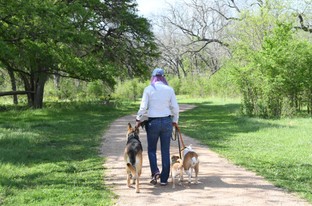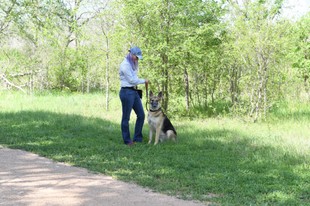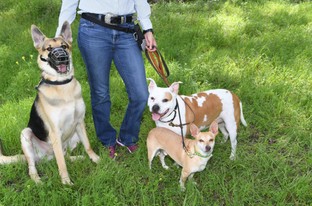 Today we’d like to introduce you to Rene Smith.
Today we’d like to introduce you to Rene Smith.
Hi Rene, please kick things off for us with an introduction to yourself and your story.
My story related to being a dog behaviorist began when I moved out of a career in the military as a burn research lab technician. Once I was able to own dogs I was quickly drawn back to my passion for them and began fostering dogs and kittens through local rescues. I also acquired several personal dogs during this time due to various unfortunate situations.
Of course, dogs making their way through the shelter and foster system have training needs, so naturally, I began to search for ways to efficiently deal with common problems such as housebreaking, crate training, and walking on leash. I initially followed and practiced the techniques of balanced trainers, but once I experienced an aggressive incident between my own dogs while pregnant with my first child, I began a transition into breed-specific, positive-based behavior modification.
Several of my personal dogs developed human and/or dog-directed aggression, and extreme behavior problems were common in dogs moving through the shelters as well, so the fight between my own dogs was the start of a deep dive into the science behind dog behavior, how dogs learn, and how to modify behavior. I already had several years of experience working with a variety of dogs at that point, so I skipped the stage of offering services focused on basic obedience and became a behaviorist specializing in aggression so I could help others who faced situations due to no fault of their own.
We all face challenges, but looking back would you describe it as a relatively smooth road?
In general, I kind of like to learn things my way (aka the hard way), so most of my journey has been a bit of a struggle, but that has given me plenty of valuable experience.
My entry into training involved a fairly steep learning curve due to the number of dogs I had personally and fostered. My transition from balanced training to behavior modification was another steep learning curve as well as a large personal adjustment, especially since the inciting event was a fight between my personal dogs.
I was also unfamiliar with many of the professional skills to work effectively with owners, but thankful I had a solid mentor, Destiny Valladares. This is the reason I pay especially close attention to learning more effective communication with humans as well as dogs, and now excel at both.
We’ve been impressed with Street Dog Rehab, but for folks who might not be as familiar, what can you share with them about what you do and what sets you apart from others?
I am a behaviorist, owner of Street Dog Rehab in Marion TX. I go beyond just dog training – I specialize in the rehabilitation of dogs with extreme behavioral challenges, including anxiety and true aggression. I take a breed-informed, individualized approach focused on meeting the dog’s needs and changing their perceptions while teaching them more acceptable ways to express their big feelings.
Unlike some other trainers, I also focus on teaching the owners themselves how to modify their dog’s behavior, instead of training only the dog directly. This approach ensures long-lasting results for those dedicated to their program since the owners are completely prepared to continue modifying their dog’s behavior and gives them the tools to head off future behavior problems. Another benefit to an owner education-focused approach is how flexible it is – I can offer training programs over zoom anywhere in the world to people who may not otherwise have access to a behaviorist.
The dog training world can feel elitist and restricting, with a lot of rules and conflicting information about what you have to do to have a well-behaved dog, so I am especially proud of my efforts to make my services accessible to as many dogs and people as possible. I spend a portion of my education hours learning to communicate more effectively with the humans I work with, and I make sure to check in on my preferred learning style so I can present material in an understandable way, and provide one on one support between sessions as well.
I am also proud to be able to help the dogs who otherwise would receive none. My favorite cases are the most complicated, the ones that have been turned away by other trainers or behaviorists. I spend a large portion of time year-round continuing my education in order to find more ways to help difficult dogs.
Is there a quality that you most attribute to your success?
Dealing with ADHD means finding creative ways to deal with day-to-day tasks, which gives me an especially creative approach to behavior modification as well. The direct experience I have managing aggressive dogs around kids with little energy sometimes gives me a uniquely empathetic and problem-solving approach to other families in need of help.
Being a single mom to two kids while caring for ten plus dogs, and managing mental health struggles gives me an intimate view into how stressful having a dog with behavioral issues is in a home with children, and how overwhelming it can feel trying to fit training into a demanding schedule, so I am always conscious to work with my clients to find a solution that fits their lifestyle.
Lastly, my consistent desire to learn more has contributed greatly to the evolution of my training techniques from balanced training to behavior modification. The more I learn and the more flexible I can be with the techniques I use, the more dogs I can help.
Contact Info:
- Email: [email protected]
- Website: https://www.streetdogrehab.com/
- Instagram: https://www.instagram.com/streetdogrehab/
- Facebook: https://www.facebook.com/groups/DTPTtexas/
- Other: linktr.ee/streetdogrehab














